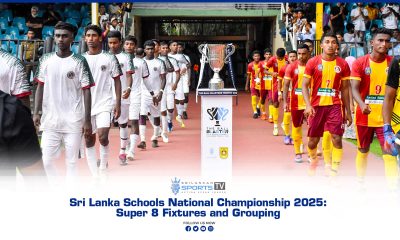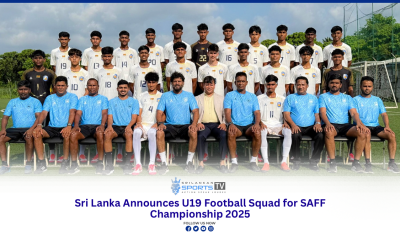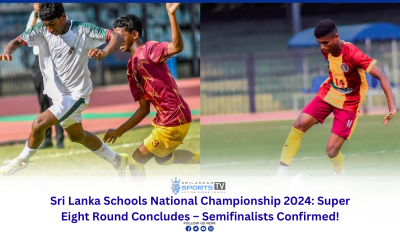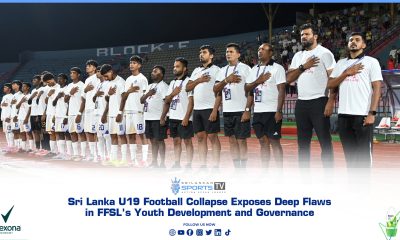Football
SAFF Championship Postponement Exposes Deeper Issues Within FFSL
The much-anticipated SAFF Championship, originally scheduled to take place in Sri Lanka in July 2025, has now been officially postponed to 2026—a move that has raised serious concerns over the competence and credibility of the Football Federation of Sri Lanka (FFSL).
According to the SAFF Executive Committee, the decision to delay the tournament stemmed largely from pressure exerted by its marketing partner, Sportfive, which advocated for a home-and-away format to increase commercial value. Furthermore, it is reported that Sportfive preferred the event be hosted in Bangladesh or India, citing better sponsor access and commercial feasibility in those countries if the tournament were to follow a centralized model.
However, beyond external pressure, this development highlights a troubling reality: the FFSL’s inability to effectively organize and defend Sri Lanka’s hosting rights on the international stage. This isn’t merely a scheduling issue—it reflects a deeper pattern of administrative shortcomings, lack of vision, and prioritization of media narratives over tangible development.
As previously reported by Sri Lankan Sports TV, the FFSL continues to focus more on optics and media stunts rather than on the foundational work required to uplift football in the country. The failure to safeguard Sri Lanka’s opportunity to host a major regional tournament not only affects the sport’s growth domestically but also damages the nation’s reputation within South Asian football.
For a federation that has long promised reform and transparency, this latest setback exposes how little progress has actually been made. When commercial partners have more sway than the national football body itself, it’s a clear indication that local football governance is being undermined by weak leadership and poor planning.
This should be a wake-up call—not just for the FFSL, but for every stakeholder invested in the future of Sri Lankan football. The time for slogans and staged announcements is over. Sri Lanka needs action, accountability, and genuine commitment to building a sustainable footballing culture. Until then, headlines like this will only continue to reflect a sport lost in mismanagement.
Football
AIFF Faces FIFA, AFC Ban Threat as October 30 Deadline Looms
Indian football is staring at yet another international suspension as FIFA and the Asian Football Confederation (AFC) have jointly warned the All India Football Federation (AIFF) to ratify its long-pending constitution by October 30, 2025, or risk a complete ban from world football.
In a strongly-worded two-page letter sent on Tuesday (August 26) to AIFF President Kalyan Chaubey, FIFA and AFC expressed “profound concern” over the failure to finalise and implement a revised constitution, a matter pending before India’s Supreme Court since 2017.
If suspended, India’s national teams and clubs would be barred from all international competitions, while the country’s ambitious 2036 Olympic Games bid in Ahmedabad could also be thrown into uncertainty.
FIFA & AFC Ultimatum
The letter, signed by FIFA’s Chief Member Associations Officer Elkhan Mammadov and AFC Deputy General Secretary Vahid Kardany, set out three urgent requirements for the AIFF:
1. Obtain a definitive Supreme Court order approving the revised constitution.
2. Ensure full compliance with FIFA and AFC statutes.
3. Formally ratify the constitution at the next AIFF General Meeting.
Failure to comply, they warned, would trigger sanctions, including full suspension of AIFF membership.
Previous Suspension in 2022
This is not the first governance crisis to hit Indian football. In August 2022, FIFA suspended the AIFF for “third-party interference” after a court-appointed Committee of Administrators temporarily ran the federation. That ban lasted just two weeks, lifted only after fresh elections were held in which Kalyan Chaubey defeated football legend Bhaichung Bhutia.
Domestic Fallout – ISL in Crisis
The deadlock has already disrupted Indian football at the domestic level. The Indian Super League (ISL), India’s top-tier professional league, has been put “on hold” by Football Sports Development Limited (FSDL), the AIFF’s commercial partner, due to uncertainty over its Master Rights Agreement, which expires in December 2025.
At least three clubs have suspended operations or delayed salaries, while all 11 ISL clubs have warned of an “existential crisis.” Reports from FIFPRO further highlight cases of players’ contracts being terminated, leaving livelihoods at risk.
The Supreme Court of India will hear the matter again on August 28, a session that could determine the immediate future of the ISL and India’s football calendar.
What’s at Stake
If AIFF fails to meet the October deadline, India could lose:
• Participation in FIFA and AFC tournaments.
• Entry rights for national teams and clubs in international competitions.
• Momentum in its 2036 Olympics bid.
• Credibility with players, fans, and commercial partners.
For now, the football fraternity in India waits anxiously for the Supreme Court’s verdict and AIFF’s ability to steer through yet another governance storm
Football
Heritage Derby Trophy Goes to Hameed Al Husseinie College
Colombo – Hameed Al Husseinie College emerged victorious in the prestigious Heritage Derby Trophy football encounter against Zahira College, Maradana, securing a 3–1 win at the Colombo Racecourse grounds yesterday.
The match kicked off under the patronage of Prime Minister Dr. Harini Amarasuriya, adding special significance to this annual football rivalry.
Hameed Al Husseinie College took control early, leading 2–0 at halftime before sealing the victory with a third goal in the second half. Zahira College managed to pull one back, but it was not enough to challenge the dominant performance of the winners.
The trophy presentation was held soon after the final whistle, with the principals of both schools — Rizvi Marikkar of Zahira College and Mrs. Dain of Hameed Al Husseinie College — present to witness the celebrations.
This latest victory adds another chapter to the rich history of the Heritage Derby, further cementing Hameed Al Husseinie College’s reputation in school football.
Football
Exclusive: AFC Fines Sri Lankan Footballer Over “Free Palestine” Message
Colombo – June 13
Sri Lankan national footballer Mohamed Thilham, who recently made headlines after displaying a “PRAY FOR FREE PALESTINE” message on his undershirt during post-match celebrations, has now been officially penalized by international football authorities.
Following Sri Lanka’s 3-1 victory over Chinese Taipei in the AFC Asian Cup 2027 Qualifiers on June 10 at the Colombo Racecourse Stadium, Thilham—a non-playing substitute—unveiled the message, drawing both praise and criticism from various quarters.

⚠️ AFC Sanctions Player with USD 2,000 Fine
FIFA, in coordination with the Asian Football Confederation (AFC), has now issued a formal disciplinary notice to the player, imposing a USD 2,000 fine. This letter, according to sources within the Football Federation of Sri Lanka (FFSL), was sent addressing to Thilham, underscoring AFC stance on politically charged expressions at official matches.
According to FIFA’s Disciplinary Code, players are prohibited from displaying political, religious, or personal slogans during matches or official ceremonies. While Thilham’s gesture occurred after the final whistle, FIFA and AFC treat any action within the stadium environment as part of official conduct.
⚽ FFSL Under Scrutiny for Disciplinary Action
FFSL President Jaswar Umar previously stated that the act “was not authorized by the federation” and “violates international football disciplinary norms.” He also confirmed that the FFSL would take internal disciplinary action against the player.
However, this incident has reignited public debate over the role of athletes in social advocacy and the limits imposed by international sports law. While some supporters see Thilham’s actions as courageous and morally driven, others have raised concerns about the player’s career stability and future opportunities under increasing scrutiny.
📝 Editorial Insight
At Sri Lankan Sports TV, we initially chose to withhold the content of the message in our match coverage—out of responsibility to the player’s career and to respect global sports protocol. However, the message went viral after several social media users circulated the full image, seemingly with the intention of sparking controversy.
The resulting spotlight has unfortunately led to a formal penalty, underscoring the real-world consequences that athletes may face when international regulations intersect with personal conviction.
-

 Live4 years ago
Live4 years agoLive Broadcast of Syria vs Sri Lanka | AFC U23 Asian Championship Qualification
-

 Football7 months ago
Football7 months agoSri Lanka Schools National Championship 2025: Super 8 Fixtures and Grouping
-

 News8 months ago
News8 months ago2025 Schools Rugby Season Set to Thrill Fans with Knockout and League Action
-

 Cricket4 months ago
Cricket4 months agoNuwan Thushara Shines as RCB Storms into IPL 2025 Final
-

 Football8 months ago
Football8 months agoFFSL Rebrands Division-1 as ‘League-One’ with a Bold New Vision
-

 News4 months ago
News4 months agoMajor Shake-Up in Sports Governance: New 2025 Regulations Reform National Sports Bodies in Sri Lanka
-

 Football4 months ago
Football4 months agoSri Lanka Announces U19 Football Squad for SAFF Championship 2025
-

 Football7 months ago
Football7 months agoSri Lanka Schools National Championship 2024: Super Eight Round Concludes – Semifinalists Confirmed!















